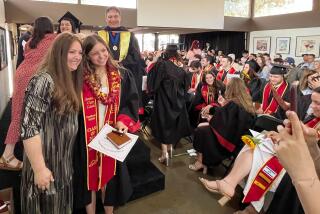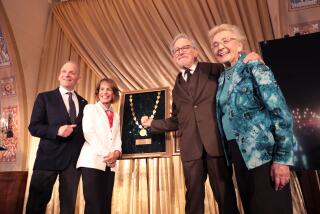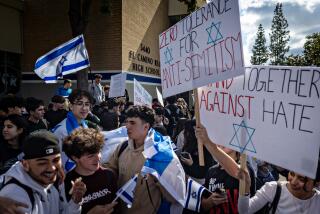A Lesson in Freedom
- Share via
Students at Milken Community High School in the Santa Monica Mountains say they are applying lessons from ancient history to ease the suffering of modern-day slaves.
The seventh- and eighth-graders have raised more than $5,000, surpassing their goal of raising enough to buy the freedom of 100 Sudanese people enslaved as a result of war.
All 260 middle-schoolers read stories in their Jewish Studies class about the plight of 27 million Sudanese because of fighting between northern and southern tribes. They also learned about the Torah’s directives on redemption of captives. Speakers, including a former Sudanese slave, shared their experiences.
Today, five days before Passover, which commemorates the Jews’ exodus from slavery in Egypt, the school is holding a rally and teach-in. Sonia Levitin, the author of “Dream Freedom,” a novel about the plight of Sudanese slaves, will speak. Other workshops will discuss personal freedom and slavery.
The students said the experience has put a living face on a story they have heard for years.
“As Jews we’re supposed to know what it means to be slaves, more than other religions,” said Allison, a seventh-grader. (School authorities allowed students to be interviewed on the condition their last names not be published because of privacy concerns.) But after hearing these accounts, “you get chills down your spine because you don’t want to believe it.”
And many people don’t.
In February, the Washington Post and the Irish Times published articles saying that the practice of buying the freedom of Sudanese slaves was corrupt and that slave redemption had become a lucrative business.
The Post article said mothers of stolen children could no longer afford to buy them back because reclamation efforts fueled by contributions from sympathetic Westerners had driven up prices.
Muslim groups also have challenged anti-slavery organizations. They believe that American and European Christian groups that support the rebel southern Sudan tribes are using the slavery claims to cast Sudan’s Muslim government in a negative light. Hassam Ayloush, executive director of the Center for Islamic-American Relations’ Southern California chapter, said taking prisoners of war is part of the culture and that captives are forced to work until their relatives can pay a ransom for them.
“Tribes of all religious backgrounds are guilty of this inhumane practice,” Ayloush said.
Milken school rabbi and Jewish studies department head Leah Kroll, who developed the project, said, “I think there needs to be a political solution to the problem,” but “that doesn’t mean in the meantime we can’t do anything.”
To raise money, brightly painted 5-gallon water jugs were placed in every classroom at the middle school campus--even next to the soda machine, so students could deposit their change, Kroll said. A dance-a-thon was held Thursday.
Some students canvassed their neighborhoods and donated blank checks to charity that were given to them at bar or bat mitzvahs, Kroll said.
“Even if we might not make the whole difference, we’re contributing,” said Loren, a seventh-grader, as he dyed a leather bracelet red in his Jewish studies class.
The bracelets will be stamped with the name, gender and country of a slave, similar to POW-MIA bracelets people wore during and after the Vietnam War.
“When you’re thinking of [slaves] as individuals it’s easier to understand,” Kroll said.
If 100 people were freed, “that could be half this school,” Loren said.
The Dream Freedom project is part of the school’s commitment to a “desert experience” during the Passover season.
Every other year the Jewish studies department tries to make the celebration meaningful by tying it to children’s lives. Kroll once brought students to the desert to reenact the Israelites’ 40 years of wandering.
The Dream Freedom project is a particularly good fit because the Passover meal recalls the suffering of the enslaved Israelites.
“It’s really important because we were enslaved and we had our Exodus, so we should give them their exodus,” said Ezra, an eighth-grader.
The students also saw parallels between this situation and more recent Jewish history.
“During the Holocaust, for all those years, no one was trying to help,” Loren said.
More to Read
Sign up for Essential California
The most important California stories and recommendations in your inbox every morning.
You may occasionally receive promotional content from the Los Angeles Times.













